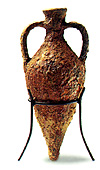|
 ALCUZA:
An earthenware vessel (or made of tin or another material),
usually of a cone-shaped, for keeping oil. ALCUZA:
An earthenware vessel (or made of tin or another material),
usually of a cone-shaped, for keeping oil.
ALMAZARA:
Oil mill.
ALPECHÍN:
Dark liquid that seeps out of olives when they are in a pile,
awaiting milling.
CAPACHO:
A round basket made of esparto that is filled with the crushed
olives, for pressing.
CATA
(TASTING):
Portion of oil that is tasted to assess its organoleptic
characteristics.
DECANTACIÓN (DECANTING):
Process whereby the oil is
separated from the alpechin liquids, by means of their
different densities.
ESCAZA:
Large saucepan used in the oil mill for adding boiling water.
ENVERO:
Olive colour when it starts to ripen and turn from green to
purplish-black.
FRUTADO
(FRUITY):
Oil flavour reminiscent of healty, fresh olives,
picked at optimum ripeness.
ORUJO
(POMACE):
Residual paste left over from the olive, that still contains
water and oil after pressing.
TRUJAL:
Olive press.
VAREAR
(TO BEAT):
Beating action using long poles to knock the olives down off the
branches. |


